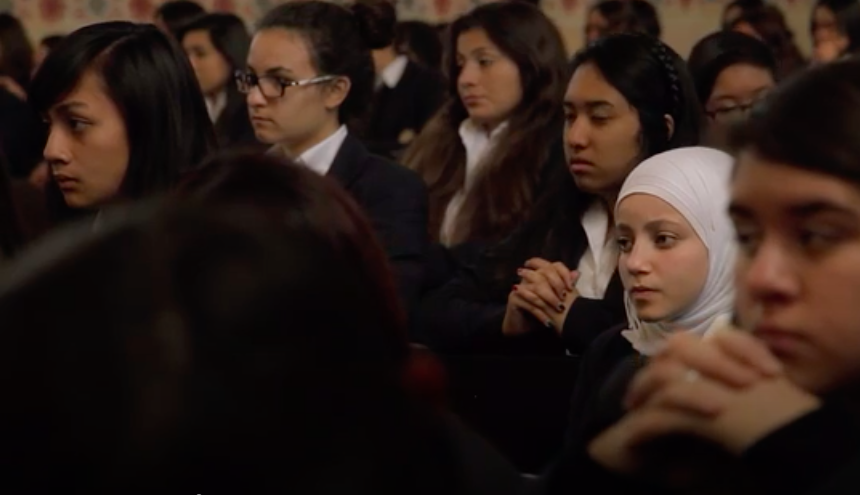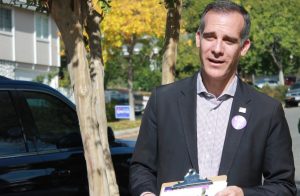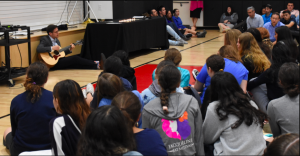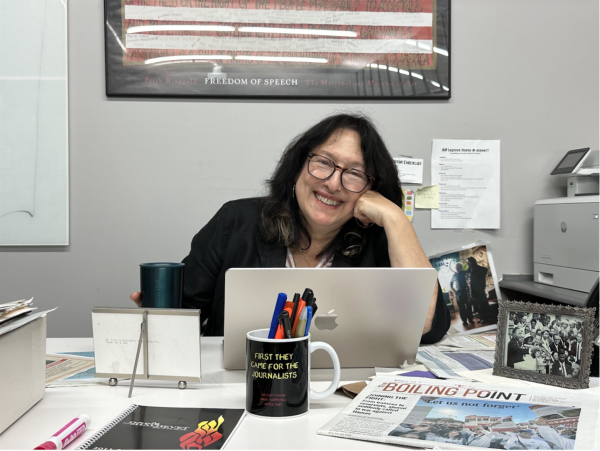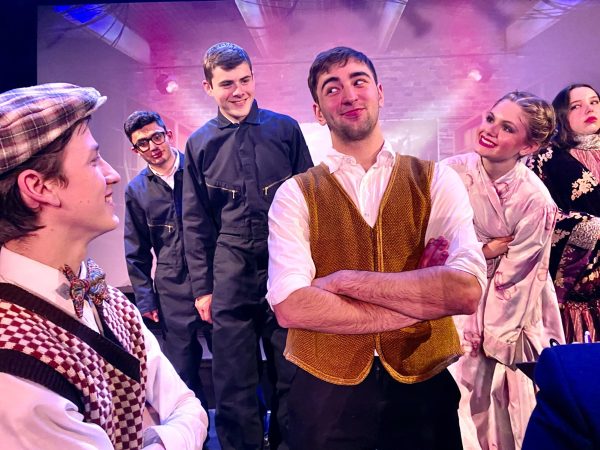Looking at refugees through a wider lens in ‘Dalya’s Other Country’
Local screening of film about a Syrian family was part of HIAS National Refugee Shabbat, which led shooter to choose target in Pittsburgh
TEEN: Dalya Zeno, second from right, attended a Catholic, all-girls private high school after immigrating from Syria in 2011.
In 2018, it seems people only are urged to help to others who are in extreme conditions. The word “refugee” evokes images of desperately malnourished children, or parents with all their possessions in sacks over their shoulders.
But in reality, war touches all kinds of people, and the refugee population ranges across all socio-economic statuses. Since the onset of the Syrian civil war in 2011, an estimated 13 million Syrians of all types, classes and beliefs have been left without a home. Some have found refuge in other countries, while six million remain displaced inside Syria itself.
Dalya’s Other Country is a one-hour-and-14-minute documentary directed and co-produced by Julia Meltzer. It was screened at the Paramount Studios in Hollywood Oct. 11 as part of the HIAS National Refugee Shabbat, arranged by B’nai David-Judea Congregation, a local synagogue. HIAS, which is short for Hebrew Immigrant Aid Society, is a 130-year-old organization that helps refugees. All proceeds from the screening were donated to the organization.
Just two weeks later, this connection between Jews and refugees was turned grotesquely on its head by a gunman in Pittsburgh. As part of the National Refugee Shabbat, like B’nai David the Tree of Life Synagogue had participated in the Pittsburgh. Shooter Robert Bowers saw this and posted on gab.com, a right-wing website: “hias likes to bring invaders in that kill our people. I can’t sit by and watch my people get slaughtered. Screw your optics, I’m going in.”
This past Saturday morning, he opened fire in that synagogue, killing 11 worshipers and wounding six people, including police officers — which in retrospect, makes the Paramount screening even more important.
The film, which is not currently in theaters, does not focus on Syrian immigrants in the most desperate of situations. Rather, it provides insight into the difficulty into being forced away from your home to a foreign country and having to grow up in a place that’s far away and unfamiliar, and knowing you never go back.
Fortuitously for the Shalhevet students in the audience, the documentary focuses on a high school student, Dalya Zeno, and her family, who were forced to leave their Syrian home town of Aleppo, which before the war was the most populous city in Syria and a massive cultural center Now, massive districts lie in rubble, some being reconstructed.
Dalya and her mother Rudayna moved to Los Angeles in 2012 to join her brother, Mustafa Zeno, who attended college in the US and is a co-producer of the film. It spans the four years of Dalya’s time in a Catholic all-girls high school here in Los Angeles.
The family is also intermittently joined by her father ,Mohammed Hassan, who has a strained relationship with his wife but loves his daughter. The film takes the audience through the milestones of Dalya’s journey from shy freshman to confident senior. She goes to dances, deals with stress from classes, and applies to college — all while wearing a hijab and being the only Muslim in her school.
And while she does need to learn a new language and meet new people, her immigration experience does not have too many road bumps.
For her parents however, it is a whole different challenge.
Dalya’s father mainly lives in Turkey because of his job selling olive oil, but the reason he lives apart from his family is because years ago he married another woman while still married to Rudayna, a practice allowed yet uncommon in Syria.
Much of Rudayna’s struggle comes from being a single mother and only knowing a culture where a woman is dependent on her husband for family life. She learns to become independent over the course of the film. Her heroic journey includes having to apply to take online classes and spending time every week working on a degree so she can eventually teach Arabic.
She does have difficulties making friends. The movie leaves unclear whether that is because she is a foreigner or because she is Muslim. This furthers the point that the problems of families like the Zenos are solved not just with money.
The seemingly infinite cultural divides that many immigrants and refugees perceive are most apparent for Dalya’s father Mohammed Hassan. In the middle of the film, he comes to LA to visit his family. Quickly, he realizes that America is not for him. He maintains an orthodox keeping of his religion which has a limited role for women. Moments when he discusses his opinions can be difficult for an American audience, but Ms. Meltzer believes it is important to show, as she stated in an interview.
“I wanted to present his perspective openly and hopefully as non judgmental as possible which was hard because I don’t agree with it,” Ms. Meltzer told The Boiling Point. “But I think what kept me kind of grounded was that I needed to show how this love that he felt for Dalya and the love that Dalya has for her father which for me was palpable.
“I hope that people can see him as a complex character,” she continued. “People like him are not ‘oh, it’s the bearded Saudi guy,’ which is terrible. No, he really cares for his children.”
Ms. Meltzer said that her goal was not to represent the entire refugee population, but rather to present an aspect of the population that is often overlooked.
“There are lots of different ways that Syrians become refugees, and the story that has dominated the media has been the one of showing people who are dramatically, severely affected who are living in refugee camps and have crossed the Mediterranean in a raft,” Ms. Meltzer said.
“I think that this is people’s perception who Syrians are that they are poor and they have nothing. My hope is that showing a family who are more middle class and have something, shows that there is a variety of experiences in people’s lives in Syria.”
This film should absolutely not be part of a fundraising effort for Syrian refugees. The Zeno family is not in need of charity. They all have American citizenship, and are middle class, with a sustainable income from Mohammed Hasan, who sends them money from Turkey, and some also from Mustafa’s work as a cultural advisor in film and a part-time Arabic teacher at YULA Boys High School.
This may have seemed confusing to some of the audience. But Dalya’s Other Country is expressly not “poverty porn,” film or images that use poor people’s suffering to gain donations or to get an audience to care. These images can successful in their goal, yet end up contributing to toxic stereotypes. Labels like “refugee” evoke a specific idea of who needs society’s help. And this film works to break that stereotype and instead give a meaningful depiction of the lives of a family of real refugees.
In a time when foreigners, especially refugees and immigrants from the Middle East, face so much hatred, every film that can lead the public to being more sensitive is ever the more important. And while Dalya’s Other Country does not represent all members of this group, it is a greater piece of the puzzle in the search for acceptance.
How painfully ironic, then, that Jews’ instinctive and eternal embrace of the stranger would lead to the very bloodshed and anti-semitism that once pushed them to leave their homes. In this time of violence and hatred, instead of pushing away those who need it most, Dalya’s Other Country invites us to look deeper and see their varied needs — as the individual human beings who they are.
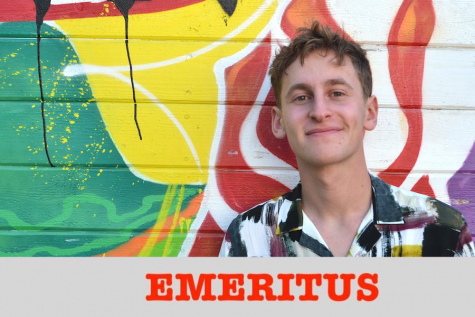
Jacob Joseph Lefkowitz Brooks was editor-in-chief during the 2019-20 school year and is now a student at the University of Toronto.

